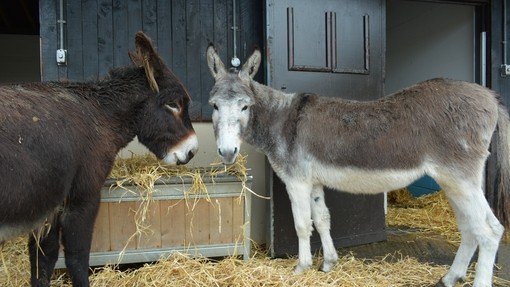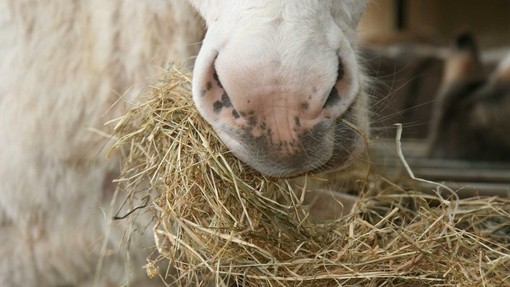Why feed straw?
As donkeys have a very high fibre, low sugar dietary requirement, straw makes a good basic feeding product. Donkeys are generally able to eat as much straw as they like to fill their bellies and keep their digestive systems moving without consuming too much energy (although testing straw before feeding is recommended as some modern strains can be higher in energy than expected). Consuming too much moderate to high energy food (particularly products containing cereal grains) causes weight gain and has been associated with development of gastric ulcers and laminitis among other things.
What kind of straw is best?
Barley straw is the best all-rounder for most healthy donkeys, as it makes a good feeding and bedding straw and is readily available.
Wheat straw is more fibrous than barley straw and more difficult to chew. We would usually only recommend feeding it to younger donkeys for this reason. Wheat straw doesn’t perform very well as a bedding material so is not generally a first choice.
Oat straw is higher in calories than barley or wheat straw, it needs to be fed with caution to avoid weight gain so may be a good option for slimmer donkeys. Oat straw is also highly prized by the feed manufacturers so it is often in short supply and more expensive.
There are other plants that can produce a straw crop such as rice, flax and rye, but these are not commonly used in the UK and we have limited knowledge about feeding them to donkeys.
How much to feed?
In terms of how much to feed, there is no single answer to this question. Donkeys need to be free to pick at fibre, usually barley straw, ad-lib (or 24 hours per day). So that means having a straw feeder available at all times, be that in the shelter, stable, barn, paddock, turn out yard or wherever your donkeys spend time. This straw needs to be replaced every day as they only like to eat fresh straw. Put yesterday’s feeding straw into today’s bed. Most donkeys need to eat at floor level as this is healthier for their digestion, respiratory system and eyes. The exception to this would be some older donkeys who have trouble bending their necks and reaching the floor. In which case, a raised feeder should be supplied where they can reach the straw easily enough without compressing the windpipe to get to the bottom of the trough. Small hole haynets can be used with donkeys, but should be tied at a comfortable height to avoid lifting the head too high, but also not so low that the donkey is at risk of getting tangled up in it.
We know, from research conducted here at The Donkey Sanctuary, that donkeys need to eat approximately 1.5% of their own bodyweight per day in dry food. Straw contains very little water and is approximately 90% dry matter. For most average-sized donkeys this equates to roughly 2-3 kg of fibre per day. It isn’t necessary to get too hung up on the numbers and start making complicated calculations as providing an ad-lib fibre-based diet will ensure your donkeys are getting enough to eat in terms of bulk. The amount can be adjusted according to the time of year. Donkeys burn more energy trying to stay warm in the winter and often end up losing a bit of weight. During the summer there are more nutrients in the grass and without monitoring your donkeys’ weight can often end up putting on a bit of weight.
What about grass, hay and haylage?
Straw should make up the majority of most donkeys’ diets, with grazing and hay or haylage being considered a top-up only. Feeding a donkey on grass and hay without providing any straw will end up over-supplying them with calories and energy, causing them to store the excess calories as fat. An overweight donkey is just as much a welfare case as an underweight donkey. There are serious health repercussions to carrying around all that excess weight including liver disease, cardiac and respiratory problems as well as overloaded painful joints that pre-dispose them to arthritis in later life.
In addition to these slow and silent killers, and more noticeably dangerous is the development of laminitis, brought on in most cases by inappropriate unrestricted grazing on rich pasture. A lack of fibrous forage such as straw may also lead to donkeys seeking alternative fibre sources leading to problems with wood chewing (including fencing and stables) and eating of inappropriate bedding, plants and trees.
Grass or hay/haylage should make up approximately 25-50% of the diet depending on the time of year. Donkeys don’t generally need to eat grass alongside hay/haylage for a large part of the year when nutrients are fairly high in growing grass. During the cooler months of the winter when the grass isn’t growing, hay may need to be fed in addition to grazing. Depending on a donkey’s condition hay/haylage could make up to 50% of the diet. We wouldn’t generally recommend feeding a larger proportion of hay/haylage than straw, even in young growing donkeys. Exceptions to this may be late-stage pregnancy or lactating mares.
What about colic?
We feed straw to the vast majority of donkeys, mules, ponies and horses kept at The Donkey Sanctuary. Our animals are all housed in groups with free access to exercise areas as opposed to being kept stabled. We feel that donkeys that are free to eat and move as naturally as possible - in a similar way to their evolutionary pattern of roaming and foraging - suffer less from impaction colic compared to stabled animals. Factors that might increase the risk of colic include a sudden introduction of straw to the diet of an animal that has not previously been fed it. Introduction to straw should be done gradually and be carefully monitored. Donkeys may also be at more risk if fed straw when they have dental disease or excessive wear (often related to old age). Finally feeding straw when water is not available or is unpalatable also presents an increased risk of a donkey developing colic.
Are there any types of donkey that shouldn’t be fed straw?
Long fibres such as straw, hay and haylage need a significant amount of chewing to break them down sufficiently enough to be swallowed. Donkeys have a large set of teeth (up to 44 teeth depending on age), the majority of which are grinding teeth at the back of the mouth (molars and premolars). Donkeys that have lost a significant number of teeth either over time or through poor dental care may have trouble selecting and chewing mouthfuls of food, in particular longer fibres.
For these ‘dental’ donkeys we don’t recommend feeding straw, hay or haylage but instead recommend pre-chopped fibres known as ‘chaff’ or ‘chop’. Chaff/chop products are easier to pick up and chew and will ensure the donkey can actually consume enough to stay healthy and avoid the risk of choking on partially chewed food.
Donkeys on box rest may need their diet adjusting, please contact your vet for advice.
What is forage testing and why should I have it done?
Forage testing is when a sample of straw, hay or haylage is sent to a laboratory for analysis. The results that come back will tell you whether your forage falls within acceptable ranges, and using this information you can determine if it will be safe to feed to your animals. One of the most important tests run on a forage sample is the sugar content. Forage samples can vary wildly in their nutritional content depending on factors such as crop species, environment, time of year cut and method of processing. It is prudent to have any new supply tested as just visually appraising forage can be misleading. This is particularly relevant for hay and haylage as energy and sugar levels in certain hays can be dangerously high for donkeys.
Several major horse feed companies as well as independent laboratories offer a forage testing service and will be able to give you guidance on taking samples and the services that they offer. The Donkey Sanctuary will always be happy to advise you on receipt of any results and help interpret whether your forage is safe to feed.




